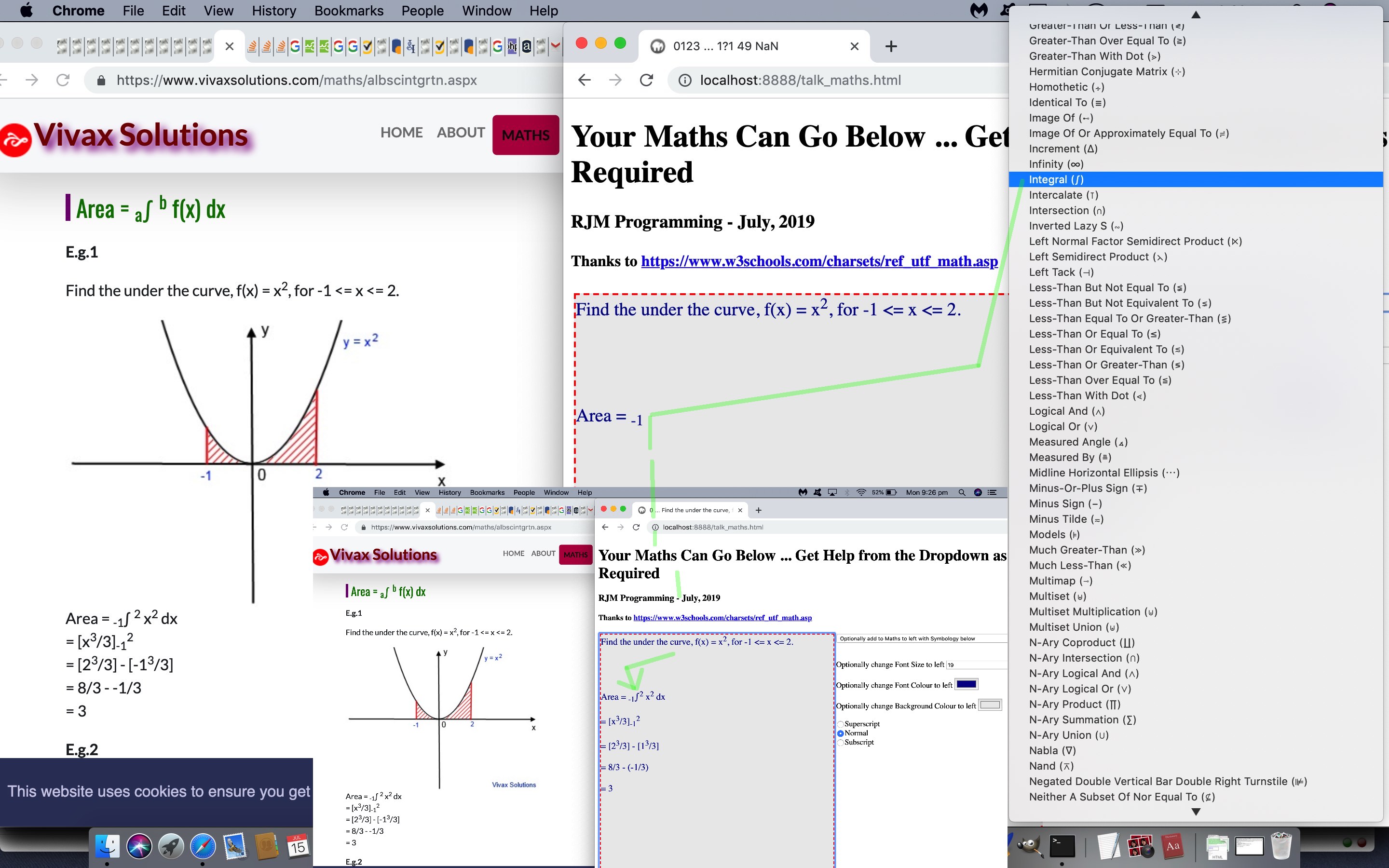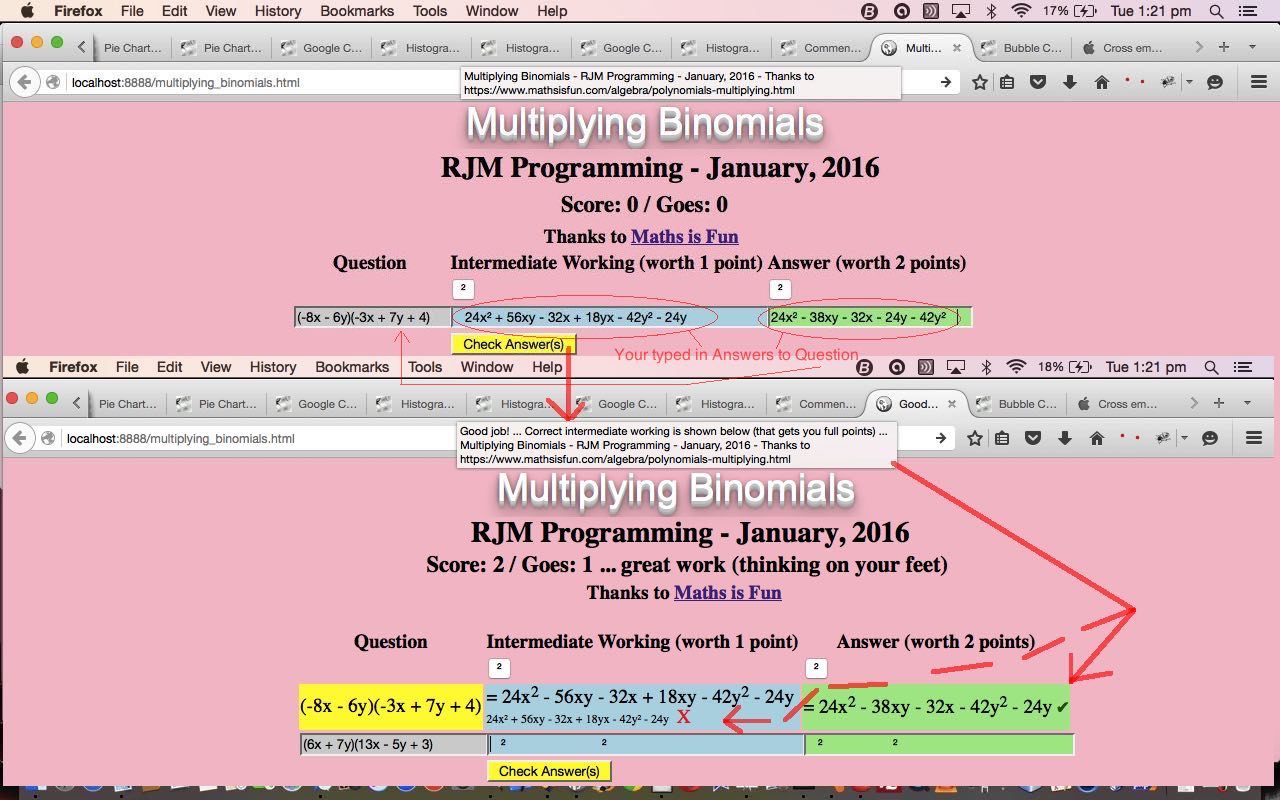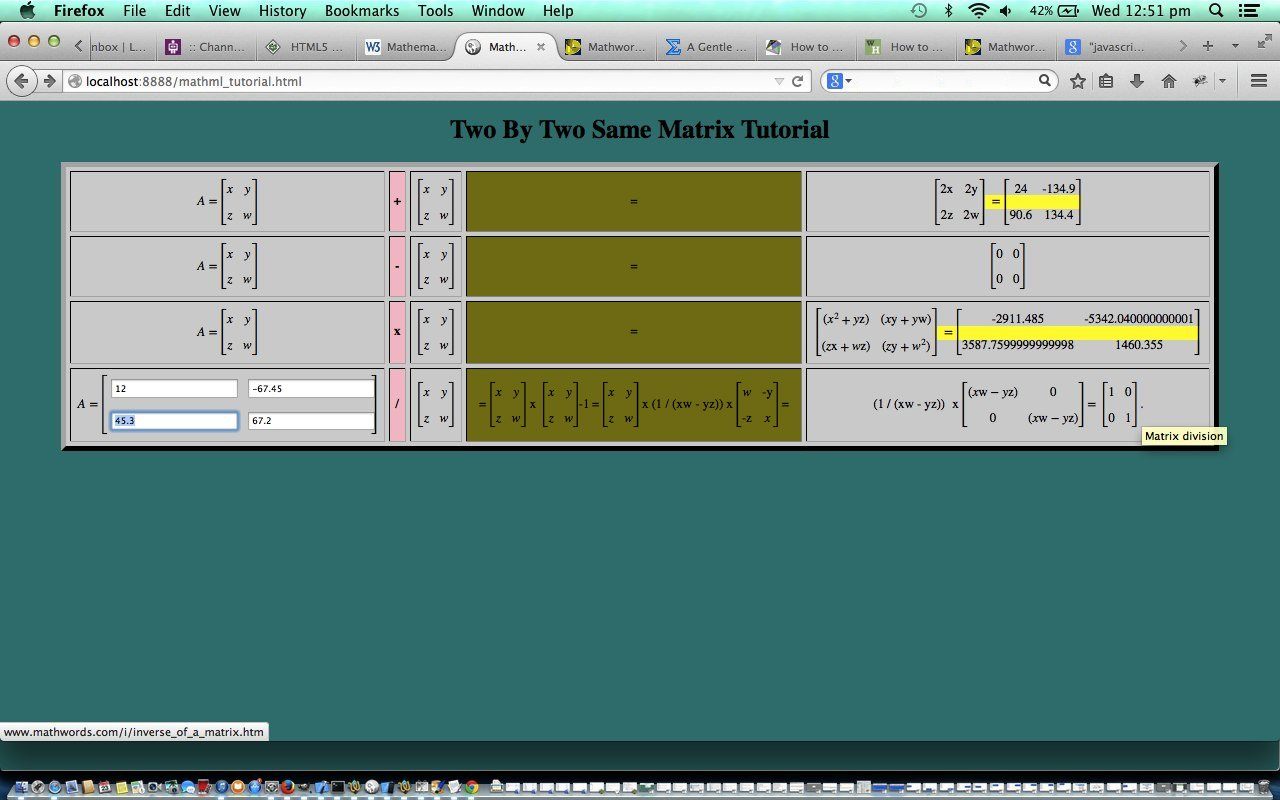We’ve long been interested by …
- HTML and Javascript and CSS web applications … that can …
- display Mathematical symbology … and be capable of …
- some sharing capabilities
So, in a similar line of thinking to HTML/Javascript Binomial Multiplication Game Jeopardy Tutorial we’re harnessing …
- HTML div contenteditable=true … and its …
- onchange and onblur value change events … as well as …
- onkeypress keyboard event (purely for a time when to intervene) … we allow for …
- display controllables are …
- content symbology helper inspired by W3school’s https://www.w3schools.com/charsets/ref_utf_math.asp (thanks) … and …
- content superscript and normal and subscript modes of placement … and …
- font colour
- background colour
- font size
… we start down our road of discovery.
At this early “proof of concept” stage we have a talk_maths.html live run link for you to explore with, or take a look at our Vivax Solutions webpage (thanks) inspired tutorial picture for today.
Previous relevant HTML/Javascript Binomial Multiplication Game Jeopardy Tutorial is shown below.
Today, as with WordPress 4.1.1’s HTML/Javascript Binomial Multiplication Game Jeopardy Tutorial, we add a Double Jeopardy (aka the game, not so much the movie) clause to our HTML/Javascript Binomial Multiplication Game Primer Tutorial starting game from a couple of days ago.
So we now have four modes of game usage …
- Multiplying Binomials (with Trinomials)
- Double Jeopardy Binomials (with Trinomials) (ie. you supply either one of the two questions that would suit the answers shown)
- Expanding to Quadratic Equations
- Double Jeopardy Quadratic Equations (ie. you supply either one of the two questions that would suit the answers shown)
This adds a lot of new mathematics functionality to the game, just building on those HTML and Javascript ideas from a couple of days ago.
If you like practising your algebra maybe you should try, and hope you enjoy, the game and/or look at the HTML/Javascript programming source code you could call multiplying_binomials.html and which changed multiplying_binomials.htmlin this way.
Previous relevant HTML/Javascript Binomial Multiplication Game Primer Tutorial is shown below.
We can probably all think of good mathematics games we could invent in a program, but when you sit down to program you can be put off by the mathematical symbols you’d like to involve in the game, but find it unwieldy to do so. Below we talked a bit about this with HTML/Javascript MathML Primer Tutorial as shown below.
The use of MathML HTML tags is a great idea for sure, but with our “Multiplying Binomials” mathematics game today, that we would like to serve up to you today, all we want is to represent the “to the power of 2” (ie: ²) symbol, and the MathML solution feels like a bit of overkill … and so we thought about it a bit …
- you can’t use HTML entities in HTML input type=text elements … so …
- nor can you use <sup>2</sup> … unless you want to look kind of dumb … but …
- suppose you put in the header section (between <head> and </head>) <meta charset=”UTF-8″ /> then we can assign a Javascript (global) variable to a copied and pasted ² found on the net somewhere, for instance … as in the code
var twosup="²";
… sounds promising as far as writing things onto the HTML input type=text element but what about the hassle for the user to have the control themselves interactively entering these ²s. Well, we can think of two useful (pragmatic) helper ideas here, they being …
- we know there are going to be two ²s involved in any one Multiplying Binomials answer so why not initialize the value first presented in the HTML input type=text element’s value with 2 ²s spread apart a little that the user can build on to build up their answer without having to worry about the keypad production of any ² … and …
- present a helper ² button that appends a ² at a time of the user’s choosing to the end of their Multiplying Binomials answer (separately for their Intermediate (show working) Answer and/or their final Answer)
We’ve used this game ourselves and found it reasonably easy to use, and it teaches you some mathematical patience to answer the Multiplying Binomials questions asked.
And what created the interest for this web application? The Maths is Fun website we think is wonderful here, as it is for so many mathematical subjects for school students, in particular.
So please try examining the HTML and Javascript programming source code, for the game, you could call multiplying_binomials.html (and just see that the var twosup=”²”; line (and any other lines containing ²) looks the way it should) and test it for yourself with a live run link.
Previous relevant HTML/Javascript MathML Primer Tutorial is shown below.
The HTML5 specification allows for the use of mathematical symbology via MathML HTML tags.
The display of mathematical symbology was not so easy to achieve very easily with older versions of HTML, and MathML makes this a lot easier for web content creators.
Today, with our tutorial, we show the use of MathML HTML tags to show operations on 2×2 matrices (in fact the matrix is the same on either side of + – x and / operators). Matrix mathematics can get hugely more complicated than in this primer tutorial, and should you want to study this further, and you are starting from scratch:
- stop scratching
- maybe start with a peruse of Wikipedia, and then take it from there to other research
- link about matrix inversion
Today we have HTML and Javascript programmable source code you could call mathml_tutorial.html and here is its live run.
If this was interesting you may be interested in this too.
If this was interesting you may be interested in this too.
If this was interesting you may be interested in this too.
If this was interesting you may be interested in this too.





